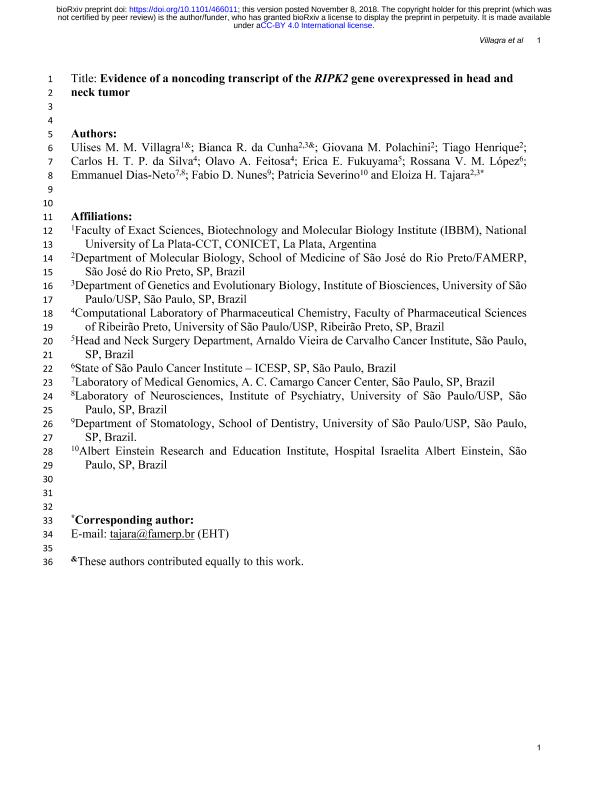Artículo
Evidence of a noncoding transcript of the RIPK2 gene overexpressed in head and neck tumor
Mancini Villagra, Ulises Maximiliano ; da Cunha, Bianca R.; Polachini, Giovana M.; Tiago, Tiago Henrique; Carlos H. T. P. da Silva; Feitosa, Olavo A.; Fukuyama, Erica E.; López, Rossana V. M.; Dias Neto, Emmanuel; Nunes, Fabio D.; Severino, Patricia; Tajara, Eloiza Helena Tajara
; da Cunha, Bianca R.; Polachini, Giovana M.; Tiago, Tiago Henrique; Carlos H. T. P. da Silva; Feitosa, Olavo A.; Fukuyama, Erica E.; López, Rossana V. M.; Dias Neto, Emmanuel; Nunes, Fabio D.; Severino, Patricia; Tajara, Eloiza Helena Tajara
 ; da Cunha, Bianca R.; Polachini, Giovana M.; Tiago, Tiago Henrique; Carlos H. T. P. da Silva; Feitosa, Olavo A.; Fukuyama, Erica E.; López, Rossana V. M.; Dias Neto, Emmanuel; Nunes, Fabio D.; Severino, Patricia; Tajara, Eloiza Helena Tajara
; da Cunha, Bianca R.; Polachini, Giovana M.; Tiago, Tiago Henrique; Carlos H. T. P. da Silva; Feitosa, Olavo A.; Fukuyama, Erica E.; López, Rossana V. M.; Dias Neto, Emmanuel; Nunes, Fabio D.; Severino, Patricia; Tajara, Eloiza Helena Tajara
Fecha de publicación:
11/2018
Editorial:
Cold Spring Harbor Laboratory Press
Revista:
bioRxiv.
ISSN:
2692-8205
Idioma:
Inglés
Tipo de recurso:
Artículo publicado
Clasificación temática:
Resumen
Receptor-interacting proteins are a family of serine/threonine kinases, which integrate extra and intracellular stress signals caused by different factors, including infections, inflammation and DNA damage. Receptor-interacting serine/threonine-protein kinase 2 (RIP-2) is a member of this family and an important component of the nuclear factor NF-kappa-B signaling pathway. The corresponding human gene RIPK2 generates two transcripts by alternative splicing, the full-length and a short transcript. The short transcript has a truncated 5? sequence, which results in a predicted isoform with a partial kinase domain but able to transduce signals through its caspase recruitment domain. In this study, the expression of RIPK2 was investigated in human tissue samples and, in order to determine if both transcripts are similarly regulated at the transcriptional level, cancer cell lines were submitted to temperature and acid stresses. We observed that both transcripts are expressed in all tissues analyzed, with higher expression of the short one in tumor samples, and they are differentially regulated following temperature stress. Despite transcription, no corresponding protein for the short transcript was detected in tissues and cell lines analyzed. We propose that the shorter transcript is a noncoding RNA and that its presence in the cell may play regulatory roles and affect inflammation and other biological processes related to the kinase activity of RIP-2.
Palabras clave:
RIPK2
,
ALTERNATIVE SPLICING
,
HEAD AND NECK CANCER
,
TEMPERATURE
Archivos asociados
Licencia
Identificadores
Colecciones
Articulos(IBBM)
Articulos de INST.DE BIOTECNOLOGIA Y BIOLOGIA MOLECULAR
Articulos de INST.DE BIOTECNOLOGIA Y BIOLOGIA MOLECULAR
Citación
Mancini Villagra, Ulises Maximiliano; da Cunha, Bianca R. ; Polachini, Giovana M.; Tiago, Tiago Henrique; Carlos H. T. P. da Silva; et al.; Evidence of a noncoding transcript of the RIPK2 gene overexpressed in head and neck tumor; Cold Spring Harbor Laboratory Press; bioRxiv.; 11-2018; 1-28
Compartir
Altmétricas



